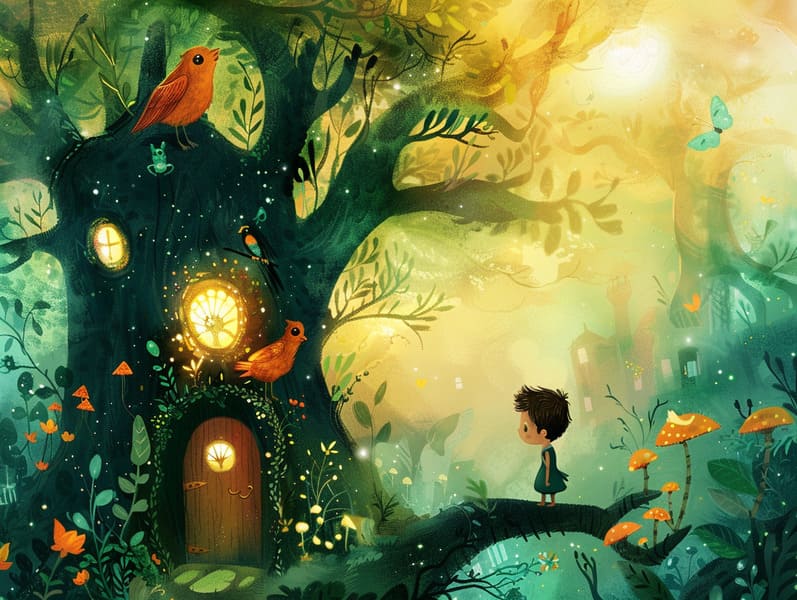Discovering the Enchantment of Evening Tales: Forming Cherished Times with Your Children
Discovering the Enchantment of Evening Tales: Forming Cherished Times with Your Children
Blog Article

Evening is a treasured time for adults and their kids. It’s a moment to ease into rest, huddle together, and partake in the charm of sleepy-time tales.
For decades, nightly tales for children have been a valued ritual, offering more than just a way to fall asleep. They provide an prospect for bonding, learning, and encouraging creativity.
Benefits of Bedtime Stories
Stories for kids at bedtime do more than a way to finish the day. They play a crucial role in a child’s evolution and in reinforcing the guardian-child tie. Here’s why they make a difference:
1. Bonding Time: Storytime before sleep strengthens a special loving connection between parents and children. It’s a moment of affection that helps children feel loved and protected.
2. Language Development: Experiencing stories helps children develop their speech skills. They learn new words, understand syntax, and refine their understanding and comprehension abilities.
3. Creative Development: Nightly stories carry them to fantastic worlds, fostering creativity. They visualize characters, settings, and adventures, which sparks their creativity.
4. Emotional Growth: Stories for little ones often depict characters facing trials and feelings. These accounts help kids understand and deal with their own feelings, enhancing emotional intelligence.
5. Cognitive Development: Listening to a tale helps children develop focus, recollection, and logical thinking. They pick up to follow plots, remember elements, and foresee consequences.
How to Make Stories Part of Bedtime
Establishing a bedtime habit that includes storytelling is simple and rewarding. Here’s how to establish a valued part of your nightly habit:
1. Choose a Relaxing Place: Find a relaxing place where you and your child can snuggle up without disruptions. A relaxing bed or a peaceful reading nook works perfectly.
2. Choose a Set Time: Determine a designated time each night for storytime. Consistency helps children be accustomed and makes the tradition easier to follow.
3. Select Stories by Age: Pick tales that suit your child’s maturity. Younger children might prefer simple books with easy plots, while bigger children may enjoy chapter books with more complex plots.
4. Interact with the Story: Ensure the tale be immersive by using different voices and accents, adding sound effects, and motivating your child to be active. Ask things about the story to hold their attention.
5. Make a Peaceful Setting: Softly light the lights, use soft voices, and create a soothing environment to help your child ease into rest.
Locating the Best Bedtime Stories
There are endless choices where you can find great bedtime stories for children. Here are some choices to check out:
1. Books for Children: Try your closest library or bookstore to find a large selection of bedtime stories for kids. Going through the books together can be a wonderful activity that also gives children to choose stories that interest them.
2. Online Sources: There are many websites that offer free bedtime stories. Sites like Storyberries provide a variety of short stories for kids that you can print out. These sites are great for finding new and different stories without expense.
3. Apps for Storytelling: For nights when you’re too drained to read, use audiobooks or storytelling apps. These can provide a relaxing voice to read your child a story, ensuring they still get their bedtime story fix. Apps often offer engaging components that can involve them further.
4. Individualized Stories: Craft your own stories inspired by your child’s passions. Personalized stories can be very engaging and meaningful. You can bring your child in the creation process, making them a part of the adventure.
Benefits of Brief Stories
Concise stories for kids are extremely helpful for bedtime. They provide all the plusses of longer stories but are more short, making them perfect for calming down before sleep. Here’s why short stories are a perfect choice:
1. Simple to Understand: Quick stories are straightforward and clear for little ones to understand, even after a long day. They can swiftly grasp the story and enjoy the story without losing interest.
2. Immediate Attention: Concise stories rapidly engage children, capturing their interest and wonder. This makes them wonderful for keeping bedtime traditions simple yet enjoyable.
3. Diverse Options: Concise narratives offer for variety in your bedtime tales. You can pick a different story each night, keeping the routine varied and exciting for your child.
4. Time Management: For busy parents, short stories are a easy way to guarantee children still these guys get their nightly dose of storytelling. They fit well into a tight schedule while still offering the full plusses of a bedtime story.
The Allure of "Read Me a Story"
The simple phrase, “Can you tell me a story?” can offer a world of magic for children. Responding to this request not only meets a child’s wish for attention and engagement but also establishes lasting times. Here’s why it’s enchanting:
1. Bond: Storytelling to your child strengthens a deep emotional link. It’s a time for intimacy, sharing, and bonding.
2. Tradition: Developing a bedtime story routine creates a beloved tradition that children anticipate every night. It’s a habit that can be passed down through generations.
3. Learning and Growing Together: As you share stories, you’ll notice your child’s development and maturation. Their engagement, reactions, and understanding of the stories change, offering insights into their developing minds.
4. Comfort Zone: Bedtime stories provide a safe space for children to understand emotions, face fears, and find comfort in the safe presence of a parent.
Wrapping Up
Bedtime stories for kids are a vital tool for developing a child’s maturation and building unforgettable events of closeness.